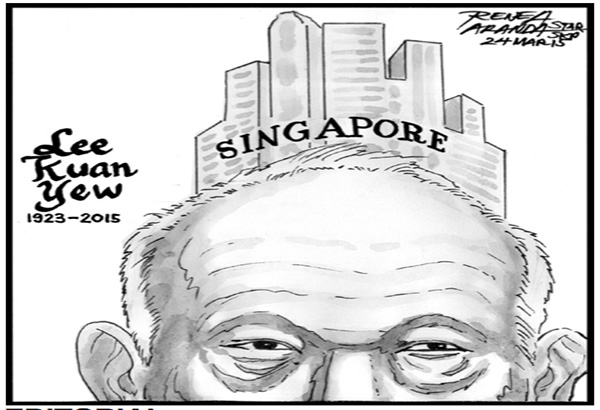“If nobody is afraid of me, I’m meaningless,” Lee Kuan Yew memorably said as he admitted agreeing with Niccolo Machiavelli’s choice between being loved and being feared. And indeed Singapore’s founding father inspired fear when he ruled his tiny city-state with an iron fist.
With that fear, however, came respect. Under Lee’s three decades of authoritarian rule, Singapore became known as the world’s “finest”city – with stiff fines imposed even for misdemeanors including jaywalking, littering, failure to flush public toilets and, most notoriously, for chewing gum. Lee did not blink when other governments sought leniency toward foreigners sentenced to death or caning in Singapore, insisting that the law must be equally applied to all.
Yet under his watch, Singapore also developed a reputation for upholding the rule of law, for reliable efficiency in public services, for clean government, and a society where people rose on merit rather than connections. Lee was one of Asia’s strongmen who firmly believed that economic rights and national security took precedence over certain civil liberties.
The economic success of Singapore has made the city-state a model for several developing countries. Despite criticism of Lee’s human rights record, his compatriots supported his endorsed successor, who was replaced a decade later by Lee’s son.
In just five decades since its bitter split from Malaysia, Singapore has become one of the world’s most prosperous nations. While it continues to rank low in press freedom and human rights indicators, Singapore has consistently topped international surveys on national competitiveness, ease of doing business, and transparency in governance. It has one of Southeast Asia’s highest levels of foreign direct investments and tourist arrivals.
From a pirate haven and post-colonial backwater, Singapore was transformed by Lee Kuan Yew into a modern economic powerhouse. In his final years as elder statesman, he saw the erosion of public support for his political party. Still, the crowds now visiting the presidential palace to bid their founding father a final farewell are there not to revile Lee Kuan Yew but to pay tribute, showing what comes close to love for a strong, visionary leader.


